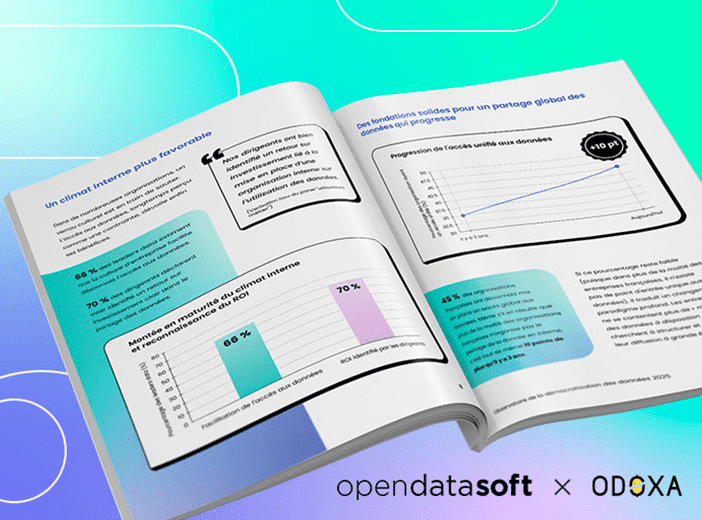The key features of a data product marketplace that deliver secure data access
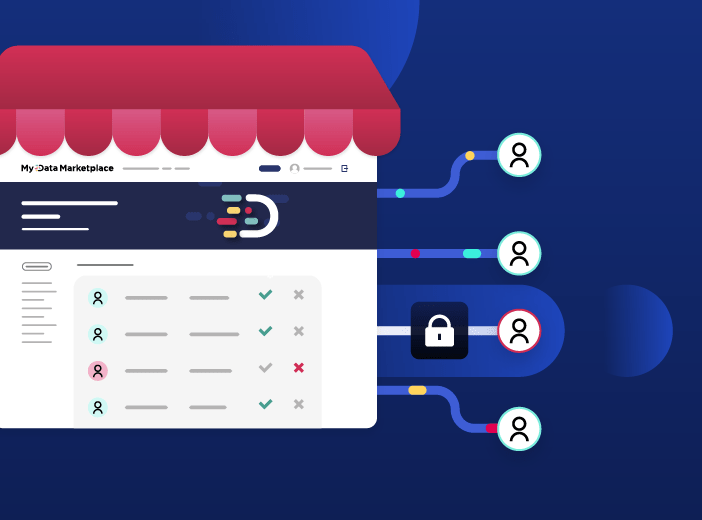
Discover how a data marketplace balances the sharing and use of data at scale across the business with secure governance and management of data access.
Managing access to data at scale is a key issue for all organizations as they strive to increase its consumption and maximize data value. Our latest Data Democratization study found that 60% of data leaders consider data sharing to be a strategic priority – a significant increase of 21% in just three years.
However, widening data access can bring challenges, especially around security. On the one hand, data and IT teams must apply solid governance policies, yet business leaders are demanding seamless, fast access to data in order to create value. This brings a growing need to balance openness with control at a time where the number of users and data products is constantly growing, and regulations around protecting data are increasing. This creates complex issues around access management, security and data governance.
Data product marketplace solutions are central to overcoming these concerns – they are designed to enable the discovery and use of data at scale, while meeting governance requirements around transparency, collaboration and security.
What is a data product marketplace? The definition according to Gartner
Here is a simplified description of a data product marketplace, inspired by Gartner’s definition:
“A data product marketplace is a collaborative platform that allows data producers to publish data products, and consumers to search, access and use them. It also provides governance teams with the ability to control, approve, and audit data access, use, and changes. This platform typically includes data contracts, which define service level management (SLAs), data quality requirements, usage rights, and data product monitoring and support terms. Data marketplaces can be used for internal, external or intra-ecosystem sharing, and promote the self-service use of data, with a strong focus on data discovery and exploration.”
This definition highlights three key capabilities of data product marketplaces:
- Features that enable collaboration and automated approval workflows, providing the foundation for data governance through access requests, permissions management, and traceability.
- Cataloguing capabilities so that business users can identify and understand what data products are available.
- Direct data consumption capabilities and the ability to act as a one-stop-shop that ensures an end-to-end data experience from discovery through access, consumption and reuse.
In practice, data product marketplaces must be robust in two dimensions, providing:
- Strict governance, to manage often complex data access rules.
- A seamless user experience, so that data consumers can easily discover, request, and use data products.
This means that data, IT and security specialists need the marketplace to deliver all the capabilities to meet their control and audit requirements, while still making data accessible to a varied audience within the organization, supporting data leaders as they aim to scale value creation from data.
The challenge: democratizing data without losing control
Given the rise of digitalization, and the fact that the volume of data assets and the number of potential users within an organization are growing enormously, access management is becoming increasingly complex. While every company adopts its own, individual governance strategy, these are generally based on one of three main models:
- Centralized: the data team acts as the sole authority, validating each data access request.
- Decentralized (data mesh): Each business area takes responsibility for its own data products and defines who can access them.
- Hybrid: a trade-off between global control and local autonomy, adapted to how sensitive data is and the organizational structure.
An effective data product marketplace must be flexible enough to operate under each of these models, aiming to guarantee both data openness and the ability to trace all activity. Without a unified platform, access becomes difficult to monitor, with data scattered across different technical tools, requiring multiple validations, cumbersome processes and leading to weaker security.
At the same time, openness is crucial to scaling data value. Business users must be able to quickly identify and access relevant data products without being blocked by endless administrative processes. A single, centralized data marketplace not only provides business users with visibility into all available resources but also allows technical teams to control and audit every request and usage, maintaining a balance between democratization and governance.
Today, 55% of organizations have not yet implemented unified access to their data, and 30% of employees still need to go through a technical expert to gain actionable insights from data. This siloed approach and lack of unified, simplified access prevents companies from realizing the tangible ROI that 70% of executives in our study believe that data provides.
The essential advantages of a data product marketplace
A single point of entry
Rather than dispersing datasets and products across different tools, the data product marketplace provides a central, intuitive interface designed specifically to encourage data discovery and usage. Users can easily find all available resources, from raw datasets to BI dashboards and other data products. This global visibility accelerates discovery and reduces duplication: anyone can check whether a specific data product exists, before considering creating a new one and without having to search for it amongst a plethora of individual tools.
A complete experience for data consumers
The data product marketplace user journey covers all stages:
- Search and discovery: by domain, keyword, or category.
- Access to metadata: descriptions, update frequency, data owner.
- Automatic validation or manual request: if access to a data asset or data product is restricted, the user simply requests access from the product owner or data governance team through a single click or call to action on the data page.
- Direct consumption: data is immediately accessible within the data product marketplace.
This seamless experience encourages business teams to apply for access to the data they need, without requiring multiple informal approvals or backdoor channels to get hold of key information.
Flexibility in defining access rights
Each company has a specific governance policy. The data product marketplace must therefore allow:
- Permissions per group, such as the marketing, finance, or IT department.
- Exceptions or granular rules: certain projects, data products or individuals require an increased level of control.
- Temporary invitations, such as for external employees or consultants, with an automatic expiry date. This avoids the growth of dormant accounts and limits the risk of data leakage once a project is complete.
- Centralized visualization of all access requests (past and current), so that administrators or data owners can, at a glance, assess the situation, check logs and validate or deny requests.
Overly rigid management blocks openness and curbs innovation. Conversely, a data marketplace without any controls would simply not meet confidentiality or regulatory compliance requirements. This means that access policies must be calibrated based on sensitivity and the company’s overall data sharing strategy to provide a secure and seamless experience at scale.
Strengthened governance
The data product marketplace is not just a showcase for data – it contains logs of requests and connections, making auditing easier. It also provides a dashboard for governance teams, allowing them to view in real time:
- Who accesses which data.
- Which access applications are pending validation.
- Which data products are the most viewed or least used.
This centralized visibility helps fine-tune governance as it happens, spot potential misuse, and document every decision, meeting both internal and regulatory requirements.
The Opendatasoft approach: combining openness and control
At Opendatasoft, we believe data only increases in value if it is shared with those who can benefit from using it. According to our latest annual study, 77% of data leaders see deploying a data product marketplace as a priority in order to facilitate access to data at scale. Our data product marketplace solution is built around multiple key principles:
Facilitate access for business teams
Our interface is designed for non-technical users. From the home page, they can immediately view the main data categories (such as marketing, sales, or human resources), while a powerful semantic search engine enables them to quickly find relevant data assets or data products, whether they are business metrics, financial reports or external data. This intuitive discoverability avoids users wasting time searching through different directories or tools.


Comply with every type of governance policy
We enable organizations to flexibly configure their roles, groups, and permissions:
- Single Sign On (SSO) authentication: synchronization with your company directory, so you don’t have to manually enter data and any corporate changes are automatically reflected in the data marketplace.
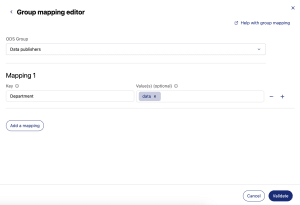
- Granular access management: One data asset or data product may be accessible to some groups by default, while other users require manual validation.
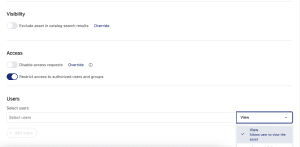
- Temporary invitations: for a subcontractor or external consultant, you can define an expiry date for access, limiting the risk of dormant accounts or data leaks.
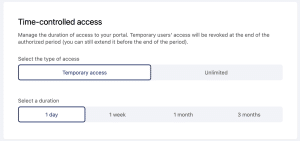
- Overview: Administrators or data owners can immediately see the status of any access requests and can adjust the rules as needed.
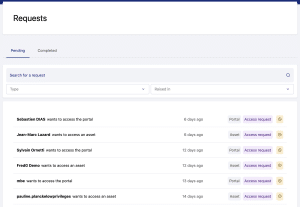
An open ecosystem
The Opendatasoft data product marketplace easily connects to existing tools, whether BI, CRM or ERP. For example, a Microsoft Power BI report can appear as a data product in the catalog. The user clicks on the product, the marketplace checks if they have access rights, and then opens the report directly, without asking them to authenticate repeatedly.
This integration avoids duplication: you don’t have to reload or recreate data assets to provide them through the marketplace. They remain hosted in the source tool, but benefit from better exposure and a unified control mechanism.
Boosting collaboration and quality
A data product marketplace is not just a catalog: it plays a role as a place for exchange and collaboration between data producers and consumers. Each data product benefits from spaces for discussion and feedback:
- Business users can comment, ask questions, report a quality issue or request changes, such as to update frequency, format, or granularity.
- Product owners receive this feedback in real-time and can respond directly on the platform, without having to manage multiple channels, such as emails or service tickets.
This continuous interaction enhances the value of data by ensuring it evolves in line with actual user needs. Business teams benefit from the ability to easily obtain the information they need, while data teams optimize their time by managing all sharing and access requests in a single place. This means that the marketplace becomes a space for co-creation, constantly improving the quality and relevance of data products.
A driver for innovation and value creation
By centralizing access to data, applying granular access management and enabling seamless collaboration, the data product marketplace provides an essential pillar of data governance and acts as a true catalyst for innovation. Thanks to the data sharing and consumption capabilities that the Opendatasoft solution provides, you can balance security and large-scale sharing. This improves decision-making, productivity and efficiency, maximizing the value of data across your organization.
Through a data product marketplace, access management becomes an enabler, rather than an obstacle to sharing. Instead of limiting access due to concerns about control, the platform allows data to be widely shared while still being protected by security and governance policies that are tailored to your organizational requirements. As a result, data sharing projects are delivered more quickly, business teams are on board, and technology investments deliver greater ROI.
Want to know more about setting up a large-scale data product marketplace with Opendatasoft? Contact us now to talk to our experts and learn how our solution can accelerate value creation from data across your organization.

High quality data is at the heart of successfully training and deploying AI algorithms and agents. Our blog explains how organizations can ensure that they are sharing easily actionable, machine readable data with AI through data products and data product marketplaces

